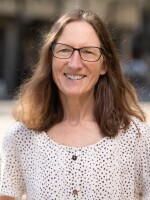Is home what our passport says, where our heart is, or something else? The title of our immigration series is “Borders, Migration and Belonging.” Here, we explore what it means to belong to a place.
At the federal courthouse in Eugene, 48 new U.S. citizens pledge allegiance to the flag. They range in age from 18 to 80 and come from 24 countries. All of them soldiered through a months- or years-long naturalization process. Dennis Hall is here with his wife Maria. As she receives instructions in the courtroom, he says she's been an Oregonian for decades:
Hall: “I think she has felt that she belongs to both this community and Mexico for the past 35 years.”
She wanted to become a citizen so she can vote, and her battered green card was becoming a problem. Now she'll have dual citizenship.

Arjuna DeSilva came from Brazil when he was five. After the ceremony, he says the papers he received today are like a diploma, proof of work he's done:
DeSilva: “I've been here for so long. It just feels like something that's been all along, but now I have confirmation of it.”
Reporter: “So it's already home.”
DeSilva: “Oh yeah, definitely. It's been home.”
DeSilva chose to get his citizenship now because he feels uncertain about green card renewal under the Trump administration. The New York Times reported this fall that applications for citizenship have surged in 2017.

Some people, like Hugo Nicolas, can't start the naturalization process. As a Dreamer, he's protected from deportation for now:
Nicolas: “For me, it feels like I feel I fit in because I'm proud to be an Oregonian. I grew up in Mexico but I don't remember most of it.”
In high school, Nicolas had a seemingly impossible goal: to join the military. To get experience, he wanted to volunteer with the police, but first he had to reveal that he and his family were undocumented.
Nicolas: “My dad was like, well, if that's what you dream of, I don't want to prevent you from doing what you want to do.”
Officers agreed to support Nicolas and he passed all the tests. He says he was so grateful to the people who went out of their way for him, he redoubled his efforts to uphold American values:
Nicolas: “I want to make sure that I pay that back to other people as well. I am successful because a lot of people help me, and I'm thankful for that.”
Audio from the film Documented: “We dream of a path to citizenship … “

The U.S. doesn't promise to protect those who aren't here legally. Jose Antonio Vargas directed and produced the autobiographical film “Documented.” He's lived in uncertainty for 20 years. Having immigrated from the Philippines as a boy, he learned at age 16 his green card wasn't valid. Since coming out as undocumented in a Pulitzer prize-winning 2011 essay, he's made a career of having difficult conversations about who belongs in this country. He was in residence at the University of Oregon this fall.
Vargas: “The media says, the politician says, that we should earn our citizenship. So what does earning it mean? On paper, you could say that I'm successful. But none of that success constitutes citizenship by law.”
Vargas is a few months too old to receive DACA. He has no option to become a citizen, but he hasn't left the country in 24 years. When Donald Trump became president, Vargas's lawyers advised him to move from his apartment. Now, he lives out of three suitcases:
Vargas: “Home is not the physical address, home is not the things that I've collected. I thought you get pieces of paper like a green card or a visa and that would be home. None of those are home. Home are all of the people that I have collected who have made me feel at home ... so people is home.”
While Vargas thinks each country should write its own rules and keep out criminals, he leans toward nearly open borders. He says people always relocate, that it's a human right and part of human history. His organization, Define American, looks at all these issues.

Vargas: “The bigger question that we haven't even gotten to really even unpack is why are people even moving? What are the root causes of migration?”
Vargas says we should consider trade policies, colonialism and who gets to draw the borders. People find their sense of belonging, whether they're born to a place or make a new home. They also feel a need to contribute to their community. The question is how those communities best make the laws about who has a right to be a part of them.
Funding for KLCC's Borders, Migration, and Belonging series is provided by the Wayne Morse Center for Law and Politics at the University of Oregon.






